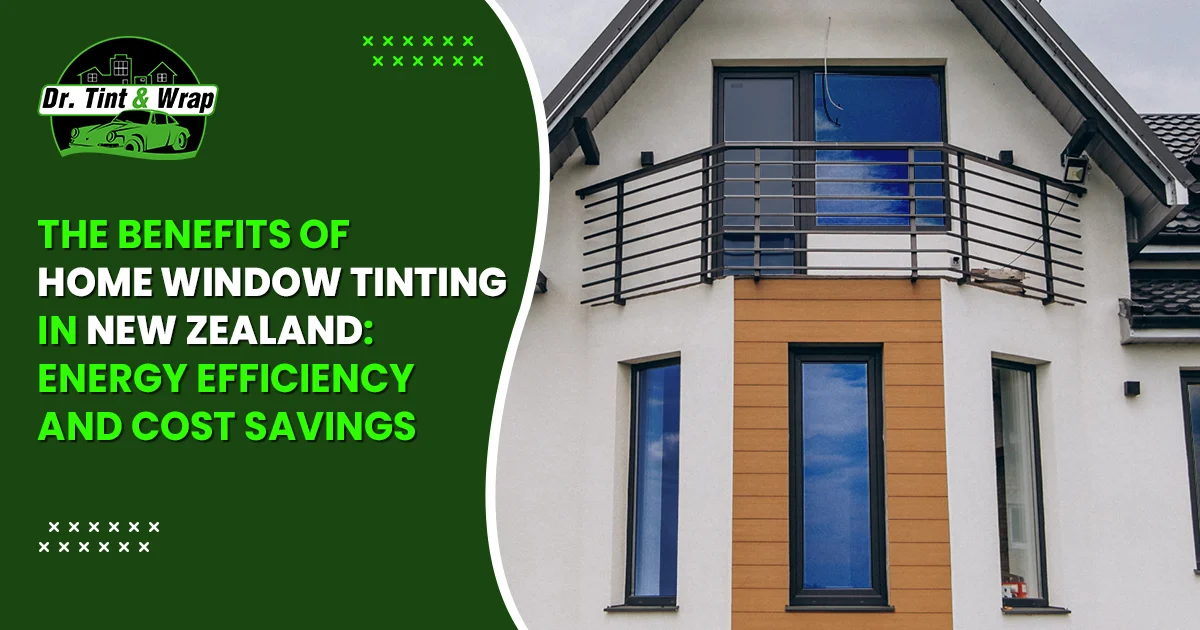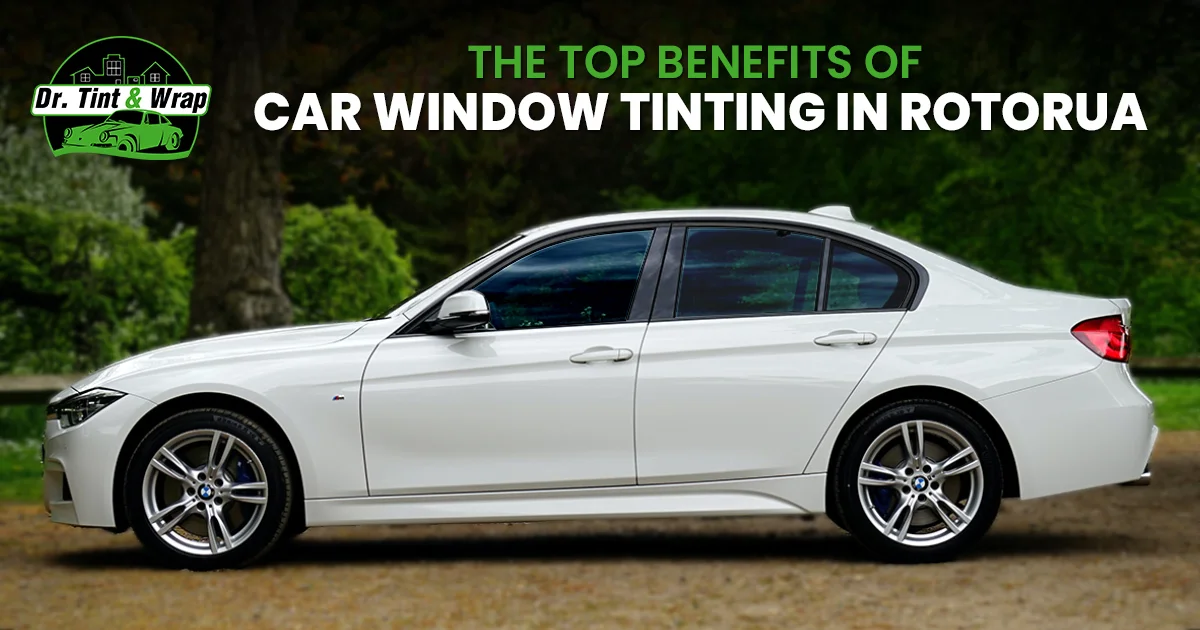
The Benefits of Home Window Tinting in New Zealand: Energy Efficiency and Cost Savings
13 Sep 2023, By AdminWhen it comes to enhancing the comfort and functionality of your home, window tinting is a solution that often goes unnoticed. In New Zealand, where climate variations are common, the benefits of home window tinting extend far beyond aesthetic appeal. In this article, we'll explore how home window tinting can significantly reduce your energy bills and lead to long-term cost savings, making it a smart investment for homeowners across the country.
Understanding the Energy Efficiency of Window Tinting
New Zealand experiences a range of weather conditions throughout the year, from scorching summers to chilly winters. During these extremes, the energy used to regulate indoor temperatures can skyrocket. This is where window tinting comes into play.
1. Heat Reduction: One of the primary benefits of window tinting is its ability to reduce heat gain. Tinted windows block a significant portion of the sun's heat and harmful UV rays from entering your home. As a result, your indoor spaces remain cooler during hot summer months, reducing the need for air conditioning.
2. Insulation: Window tinting also provides insulation benefits, helping to maintain a consistent indoor temperature. In winter, it helps to keep warmth inside, reducing the need for excessive heating.
Cost Savings Through Window Tinting
Now, let's delve into how these energy-efficient qualities translate into tangible cost savings for homeowners in New Zealand.
1. Lower Energy Bills: By reducing heat gain during the summer and heat loss during the winter, window tinting significantly reduces your reliance on heating and cooling systems. As a result, you'll see a noticeable drop in your energy bills year-round.
2. Extended Appliance Lifespan: Reduced reliance on air conditioners and heaters not only saves you money on electricity but also extends the lifespan of these appliances. They don't have to work as hard, which means fewer repairs and replacements.
3. Furniture and Flooring Preservation: Window tinting also blocks harmful UV rays that can cause fading and damage to your furniture, flooring, and décor. This means you won't have to spend as much on replacing or refurbishing these items.
4. Enhanced Home Value: A home with energy-efficient features like window tinting can command a higher resale value in the New Zealand real estate market. Potential buyers are often willing to pay more for a home with reduced energy costs.
In New Zealand, where energy efficiency and sustainability are becoming increasingly important, home window tinting stands out as a practical investment for homeowners. By reducing energy bills, extending the lifespan of appliances, preserving your interior, and enhancing your home's value, window tinting offers numerous long-term cost-saving benefits.
So, if you're looking to make your New Zealand home more energy-efficient and cost-effective, consider investing in professional window tinting services. Not only will you enjoy a more comfortable living space, but you'll also contribute to a greener and more sustainable future while saving money in the process.

The Top Benefits of Car Window Tinting in Rotorua
13 Sep 2023, By AdminIn the picturesque city of Rotorua, where stunning landscapes meet abundant sunshine, car window tinting has become more than just a trend—it's a practical necessity. Whether you're a local or a visitor, understanding the benefits of car window tinting in Rotorua is essential for a comfortable and protected driving experience. In this blog, we'll delve into the top advantages of car window tinting in Rotorua, focusing on the keyword "Car Window Tinting Rotorua."
1. UV Protection: Shielding You and Your Car Interior
Rotorua is known for its sunny weather, and with the sun comes harmful UV rays. Car window tinting is your first line of defense against these rays, as it can block a significant portion of them. Not only does this protect your skin from potential damage during your drive, but it also safeguards your car's interior from fading and deterioration caused by prolonged sun exposure.2. Enhanced Privacy: Peace of Mind on the Road
Privacy is a valuable asset, especially when driving through the bustling streets of Rotorua. Window tinting provides an added layer of privacy by making it harder for prying eyes to see into your vehicle. This added security ensures your personal space remains personal, whether you're stuck in traffic or parked in a busy area.
3. Heat Reduction: Stay Cool Even on the Hottest Days
Rotorua's summers can be scorching, and the inside of your car can quickly turn into an oven. Car window tinting is your ally in staying cool. By blocking a significant portion of the sun's heat, tinted windows help regulate the temperature inside your vehicle, ensuring a more comfortable ride even during the hottest days.
4. Glare Reduction: Clearer Visibility, Safer Driving
Glare from the sun can be blinding and dangerous while driving. Car window tinting in Rotorua helps reduce glare, providing better visibility and reducing the strain on your eyes. This results in safer and more comfortable driving conditions, especially during sunrise and sunset.
5. Interior Preservation: Keep Your Car Looking New
Rotorua's sun can be harsh on your car's interior, causing it to fade and deteriorate over time. Window tinting acts as a protective shield, preventing sun damage to your dashboard, upholstery, and other interior components. This preservation not only keeps your car looking newer for longer but also maintains its resale value.
6. Energy Efficiency: Reduced Air Conditioning Use
With car window tinting in Rotorua, you'll find yourself relying less on your car's air conditioning system. This reduced need for cooling can lead to improved fuel efficiency and savings at the pump, all while reducing your carbon footprint.
7. Customization: Personalize Your Ride
Car window tinting isn't just practical; it's also an opportunity to customize your vehicle. You can choose from various tint shades and styles to achieve the look you desire while still enjoying all the functional benefits.
Car window tinting in Rotorua isn't just a luxury; it's a practical investment that enhances your driving experience and protects both you and your vehicle from the challenges posed by the city's climate. From UV protection to privacy and heat reduction, the benefits are clear. So, if you want to enjoy safer, more comfortable, and stylish drives through Rotorua, consider car window tinting as a valuable addition to your vehicle. Experience the advantages of "Car Window Tinting Rotorua" firsthand and make the most of your time on the road.

Car Window Tinting for Health and Skin Protection: Understanding the Benefits in Rotorua
13 Sep 2023, By AdminIf you are a resident of Rotorua or anywhere with a sunny climate, you know how intense the sun can be during the summer months. While enjoying the scenic beauty of the region, it's essential to consider your health and skin protection while driving. One effective way to combat the harmful effects of UV rays and maintain a comfortable driving experience is through car window tinting. In this blog, we will explore the benefits of car window tinting, particularly in the context of Rotorua's sunny weather.
The Need for Car Window Tinting in Rotorua
Rotorua is blessed with stunning landscapes, geothermal wonders, and an inviting climate. However, this also means prolonged exposure to sunlight, and the UV rays can have adverse effects on your health and skin. Let's dive into some reasons why car window tinting is crucial in this beautiful region:
1. Protection Against Harmful UV Rays
The intense sunlight in Rotorua contains harmful ultraviolet (UV) rays that can penetrate your car's windows. These rays can not only cause skin damage but also lead to premature aging and an increased risk of skin cancer. Car window tinting acts as a protective barrier, blocking a significant portion of UV rays and ensuring your skin's safety during daily commutes and road trips.
2. Skin Protection for Drivers
While driving, the left side of your body is more exposed to the sun, making it more susceptible to UV damage. Car window tinting can help protect the driver's skin from excessive UV radiation, reducing the risk of skin-related health issues in the long run.
3. Enhanced Comfort and Reduced Glare
Excessive sunlight and glare can make driving uncomfortable and hazardous, especially during the early morning and late afternoon. Window tinting significantly reduces glare, allowing you to drive with improved visibility and better focus on the road ahead.
4. Heat Reduction
Rotorua's hot climate can lead to uncomfortably high temperatures inside your car, especially when it's parked under direct sunlight. Car window tinting can significantly reduce the amount of heat that enters your vehicle, making your driving experience more pleasant and preventing the risk of heat-related illnesses.
5. Protection for Your Car's Interior
UV rays can also damage the interior of your car over time. Prolonged exposure can cause the dashboard, seats, and other surfaces to fade and deteriorate. Window tinting helps preserve your car's interior, maintaining its value and appearance for years to come.
Choosing the Right Window Tint
Now that we understand the importance of car window tinting in Rotorua, it's essential to choose the right tint for your car. There are various types of window tints available, each with different levels of UV protection, heat rejection, and light transmission. To get the best results, consider the following factors:
1. Visible Light Transmission (VLT): VLT indicates the amount of visible light that can pass through the window tint. Rotorua's regulations may specify the legal VLT limit for car window tinting, so ensure you comply with these guidelines.
2. UV Protection: Look for tints that offer high UV protection, as this is one of the primary reasons for getting your windows tinted.
3. Heat Rejection: For Rotorua's hot climate, choose a tint with good heat rejection properties to keep your car's interior cooler.
4. Warranty: Opt for window tinting products that come with a warranty, ensuring you have support in case of any issues. Professional Installation
To reap the full benefits of car window tinting, it is crucial to have the tint professionally installed. Experienced technicians will apply the tint evenly and without any air bubbles or imperfections, ensuring the best results in terms of aesthetics and functionality.
Car window tinting is not just about enhancing the appearance of your vehicle; it's an investment in your health and well-being. In sunny regions like Rotorua, protecting yourself from harmful UV rays is of paramount importance. Window tinting not only safeguards your skin but also provides a cooler and more comfortable driving experience. If you haven't considered car window tinting before, now is the time to do so. Stay cool, stay protected, and drive safely on the beautiful roads of Rotorua!
Dr. Tint & Wrap Rotorua offers top-notch car window tinting services, providing the best solutions to ensure health and skin protection. Their expert tinting helps block harmful UV rays, safeguarding passengers from potential skin damage and promoting a comfortable driving experience.

The Benefits of Home Window Tinting in New Zealand: Energy Efficiency and Cost Savings
13 Sep 2023, By AdminWhen it comes to enhancing the comfort and functionality of your home, window tinting is a solution that often goes unnoticed. In New Zealand, where climate variations are common, the benefits of home window tinting extend far beyond aesthetic appeal. In this article, we'll explore how home window tinting can significantly reduce your energy bills and lead to long-term cost savings, making it a smart investment for homeowners across the country.
Understanding the Energy Efficiency of Window Tinting
New Zealand experiences a range of weather conditions throughout the year, from scorching summers to chilly winters. During these extremes, the energy used to regulate indoor temperatures can skyrocket. This is where window tinting comes into play.
1. Heat Reduction: One of the primary benefits of window tinting is its ability to reduce heat gain. Tinted windows block a significant portion of the sun's heat and harmful UV rays from entering your home. As a result, your indoor spaces remain cooler during hot summer months, reducing the need for air conditioning.
2. Insulation: Window tinting also provides insulation benefits, helping to maintain a consistent indoor temperature. In winter, it helps to keep warmth inside, reducing the need for excessive heating.
Cost Savings Through Window Tinting
Now, let's delve into how these energy-efficient qualities translate into tangible cost savings for homeowners in New Zealand.
1. Lower Energy Bills: By reducing heat gain during the summer and heat loss during the winter, window tinting significantly reduces your reliance on heating and cooling systems. As a result, you'll see a noticeable drop in your energy bills year-round.
2. Extended Appliance Lifespan: Reduced reliance on air conditioners and heaters not only saves you money on electricity but also extends the lifespan of these appliances. They don't have to work as hard, which means fewer repairs and replacements.
3. Furniture and Flooring Preservation: Window tinting also blocks harmful UV rays that can cause fading and damage to your furniture, flooring, and décor. This means you won't have to spend as much on replacing or refurbishing these items.
4. Enhanced Home Value: A home with energy-efficient features like window tinting can command a higher resale value in the New Zealand real estate market. Potential buyers are often willing to pay more for a home with reduced energy costs.
In New Zealand, where energy efficiency and sustainability are becoming increasingly important, home window tinting stands out as a practical investment for homeowners. By reducing energy bills, extending the lifespan of appliances, preserving your interior, and enhancing your home's value, window tinting offers numerous long-term cost-saving benefits.
So, if you're looking to make your New Zealand home more energy-efficient and cost-effective, consider investing in professional window tinting services. Not only will you enjoy a more comfortable living space, but you'll also contribute to a greener and more sustainable future while saving money in the process.
